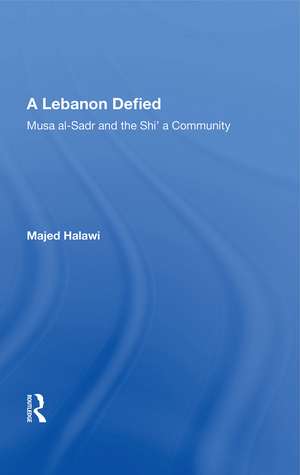A Lebanon Defied: Musa al-Sadr and the Shi’a Community
Autor Majed Halawien Limba Engleză Hardback – 7 iun 2019
Preț: 764.20 lei
Preț vechi: 1027.40 lei
-26% Nou
Puncte Express: 1146
Preț estimativ în valută:
146.23€ • 153.06$ • 121.71£
146.23€ • 153.06$ • 121.71£
Carte tipărită la comandă
Livrare economică 31 martie-14 aprilie
Preluare comenzi: 021 569.72.76
Specificații
ISBN-13: 9780367012366
ISBN-10: 0367012367
Pagini: 268
Dimensiuni: 149 x 229 x 18 mm
Greutate: 0.45 kg
Ediția:1
Editura: Taylor & Francis
Colecția Routledge
Locul publicării:Oxford, United Kingdom
ISBN-10: 0367012367
Pagini: 268
Dimensiuni: 149 x 229 x 18 mm
Greutate: 0.45 kg
Ediția:1
Editura: Taylor & Francis
Colecția Routledge
Locul publicării:Oxford, United Kingdom
Cuprins
Introduction -- The Shi’a in Lebanese History -- Shi’a Society by Numbers -- Traditionalism and Revolution -- Leader and Movement -- Mythos and Praxis -- Conclusion -- Appendixes
Descriere
The 1980s were a watershed in the history of the Shi’a community in Lebanon. From the attacks on Israeli forces in South Lebanon in the aftermath of the 1982 invasion, through the final withdrawal of the multinational force from Beirut in March 1984, the Shi’a have decisively thrust themselves into the international political arena. Majed Halawi explores the origins of this Shi’a movement and its determination to become a major participant in a sharply reformed Lebanese polity. The tale is rooted in Lebanon’s history and sociopolitical culture, in the seeds of its civil war, and in the mobilization of the hitherto “marginal” masses. A Lebanon Defied is therefore an analysis of the dynamics of politicization. On the one hand, there is the political leadership of Sayyid Musa al-Sadr, which drew upon Shi’ism as a revolutionary paradigm in order to provoke the transformation of the Shi’a masses into a self-conscious and politically articulate group. On the other hand, there is the experience of modernization that the Shi’a community underwent in nearly three decades of Lebanese independence. The interaction between these two factors is the primary concern of this study. Halawi’s critical analysis is informed by the need to produce an account that the Shi’a community itself would consider an adequate representation of its modern experience in Lebanon.
